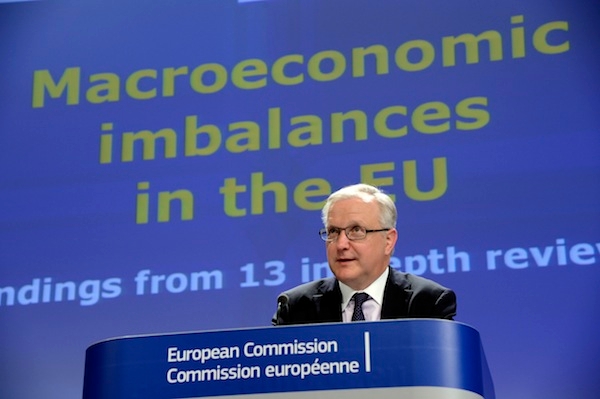Olli Rehn, the European Commissioner who is in charge of economic affairs, called in the Brussels press corps this afternoon to announce the conclusion of his ‘in-depth review of the macroeconomic imbalances in 13 member states.’ I sat through the launch, and the questions and answers, noting that at no time did Rehn or any of the reporters approach the fundamental question: what exactly is a macroeconomic imbalance and why do we think that Rehn – whose full title includes European Commissioner for the Euro – is the man anyone would trust with analysis of anything macroeconomic?
And before you ask, the reason I didn’t ask is that I ration any questions that I know the spokesmen who run these press conferences will consider obnoxious. I have to deal with these people long term.
Still, I could have pointed out that the corpses of what were once red-blooded European countries are now piled up and oozing around Rehn’s desk. It is absurd he should now give his analysis of the state of any kind of ‘imbalances’ in countries both inside and outside the euro – indeed, today he had a list of Britain’s ‘imbalances.’ He said he was presenting his analysis as ‘raw material’ to the British for when they draw up their next economic plan. The British, like the rest of the 27, must draw up a plan which will meet the approval in the economic policy coordination of this year’s European Semester. Otherwise known as the economic government of the EU.
Yes, the Cameron-Clegg government has colluded in the establishment of an EU economic government. Rehn now has increased powers to boss around the Chancellor. This particular bit of bossiness comes from the Alert Mechanism Report of November 2012, which has led to this In-Depth Review under the Macroeconomic Imbalances Procedure, and yes it’s dull and makes you snooze, but all I can say is: guess what happened while you were sleeping? More power went from Britain to Brussels.
So here are some of what is wrong in Britain, according to the European Commissioner for the Euro: household debt is likely to remain high. There is deterioration in external competitiveness, with negative trade balance mainly as the result of a chronic deficit in goods trade. The government deficit, although decreasing, remains elevated while government debt is high and increasing. The stock of UK corporate debt is moderately high and there are signs of less-than-viable companies being kept in business through low interest rates and bank forbearance. Structural weaknesses. Shortages in airport and seaport capacity. The challenge linked to deleveraging.
And on and on, a list of things we all knew anyway, from the commissioner who helped create the disasters in Italy, Greece, Spain, Portugal, Cyprus, Ireland and stand by for France and Slovenia.
In the end, I slid in next to one of the top eurocrats who prepared this review for Rehn, and asked him what exactly was the definition of ‘macroeconomic imbalance’ anyway, especially since the commission seemed to think Britain was riddled with it.
He told me: ‘A macroeconomic imbalance is anything that could put a country in trouble, that can lead to booms and busts. For example, excessive credit growth, excessive housing boom, excessive government debt. It is a term that is so wide that we do not have operational criteria. It is a matter of judgement.’
So ‘macroeconomic imbalances’ are anything the eurocrats say they are, and once the macroeconomic imbalances are identified by the commission, Rehn can jump in and tell George Osborne, or any other finance minister, what he needs to do to meet EU demands.
The eurocrat assured me: ‘We do this as a service.’






Comments